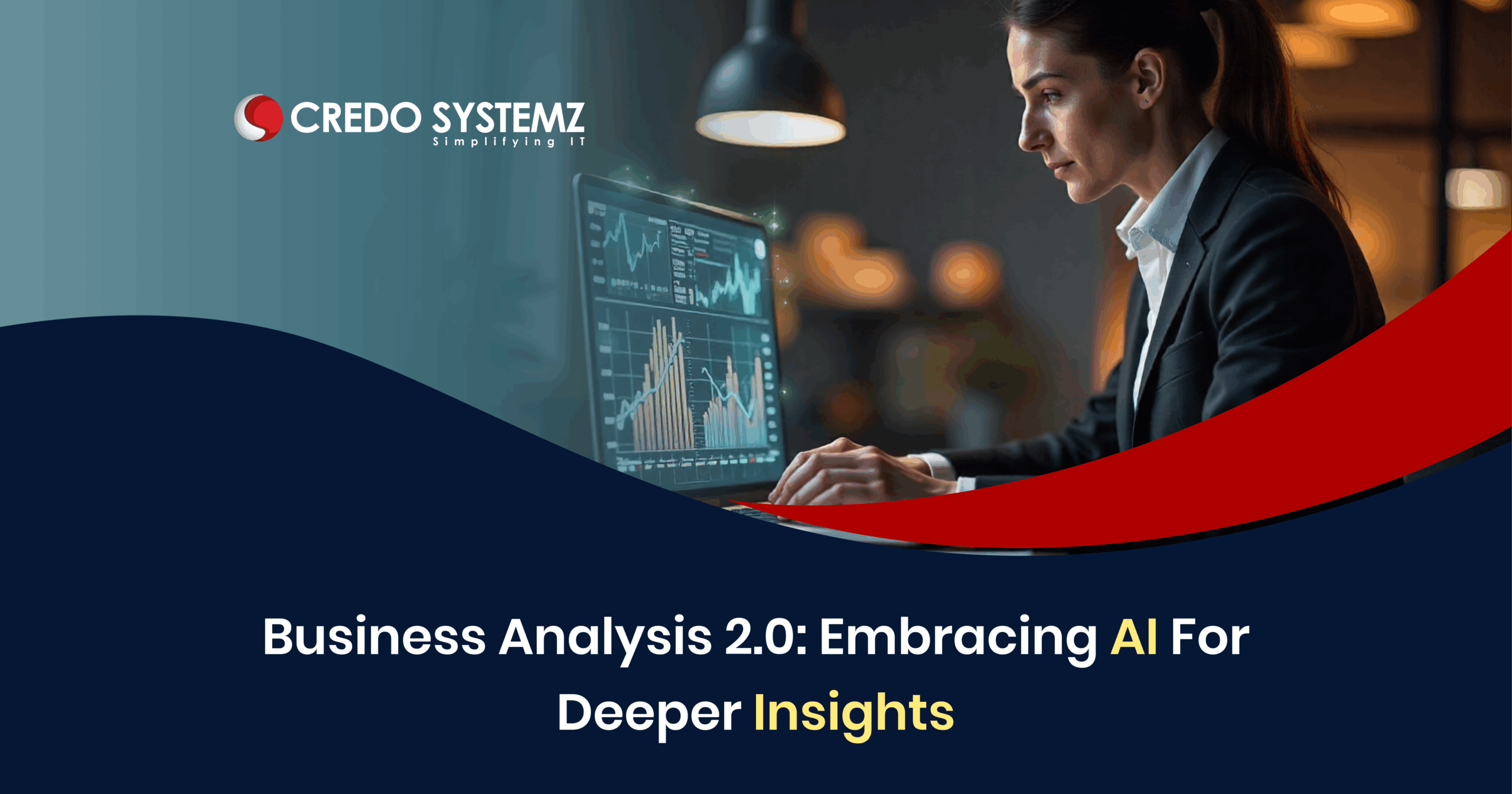
Business Analysis 2.0: Embracing AI for Deeper Insights
In today’s rapidly evolving digital era, business analysis is undergoing a significant transformation into a new phase – Business Analysis 2.0. This AI-powered evolution is reshaping the way analysts interact with data, stakeholders, and strategies. Artificial Intelligence (AI) plays an important role in extracting, interpreting, and predicting insights that drive smarter business decisions.
Business Analysis 2.0
Business Analysis 2.0 is the next-generation approach to business analysis by integrating AI technologies. It embraces predictive and prescriptive analytics and moves beyond descriptive analytics and diagnostic analytics.
Machine learning, natural language processing (NLP), and robotic process automation (RPA) are embedded in the business analysis workflow to transform raw data into actionable intelligence.
Embracing AI in Business Analysis
In business analysis, the key reasons to embrace AI are:
- Enhanced decision making
- Automated Data Discovery
- Personalized Insights
- Reduced Manual Effort
1. Enhanced Decision-Making
AI empowers analysts to improve the process of data-driven decision making with the ability to handle large volumes of structured and unstructured data faster than before. This decision making is supported by predictive models and real-time insights.
2. Automated Data Discovery
AI tools can automate data discovery and uncover hidden trends, patterns, and anomalies in data. It includes identifying, extracting, classifying, and analyzing data across different sources.
AI and machine learning replaces traditional manual data exploration and analysis using natural language processing (NLP).
3. Personalized Insights
AI systems can tailor insights to specific teams and users which ensures that every stakeholder receives the appropriate information.
With AI-powered personalised insights, business analysts can get proactive alerts and most relevant information.
4. Reduced Manual Effort
AI allows analysts to focus on higher-value strategic thinking by automating routine tasks such as:
- Report generation
- Data cleansing
- Documentation
Key AI Technologies Transforming Business Analysis
| AI Technology | Role in Business Analysis |
|---|---|
| Machine Learning (ML) | To make forecasts and recommendations based on historical data |
| Natural Language Processing (NLP) | Analyzes textual data such as customer feedback and social media content. |
| Robotic Process Automation (RPA) | Automates repetitive business analysis tasks and workflows. |
| Cognitive Analytics | Simulates human thought processes in analyzing complex datasets. |
| AI-Powered Visualization Tools | Enhances dashboards and data storytelling through intelligent design. |
Real-World Use Cases
- Customer Behavior Prediction: AI models forecast customer actions, buying behavior, and preferences based on past data.
- Market Trend Analysis: NLP tools guide strategic positioning by analyzing industry news and sentiment.
- Operational Optimization: RPA bots automate inventory analysis and process bottleneck identification.
- Risk Assessment: ML algorithms can be used to identify financial risks or compliance issues before they escalate.
The Future Analyst
The modern business analyst performs various roles apart from requirement gatherer, such as:
- Data storytellers
- AI collaborators
- Strategic partners in decision-making
Business analysts must learn the foundational AI concepts and gain hands-on experience with AI-powered tools. Develop strong communication skills as well to explain AI insights to non-technical stakeholders. To master the skills of AI in business analysis, join Credo Systemz AI in business analysis training in Chennai.
Stay Updated as AI is evolving. Follow blogs, join communities, and attend AI meetups or webinars.
Conclusion
To sum up, Business Analysis 2.0 is the trend happening right now. By embracing AI, organizations can unlock deeper insights, faster responses, and smarter strategies. If you are a business analyst, this is a golden opportunity to upskill yourself to deliver real value in an AI-augmented world.
Want to know more about the course curriculum, career counseling, or video references? Just ping us on WhatsApp!

Join Credo Systemz Software Courses in Chennai at Credo Systemz OMR, Credo Systemz Velachery to kick-start or uplift your career path.
Business Analysis with AI – FAQ
AI can process large datasets quickly and identify hidden trends which is followed by generating actionable insights.
- Power BI with AI features
- Tableau with AI-driven analytics
- Microsoft Copilot
- ChatGPT
- Data visualization skills
- AI-based analytics tools
- Basics of machine learning
- Data storytelling
- Prompt engineering
AI helps in forecasting future market behavior, customer demand, and sales trends using historical and real-time data.
